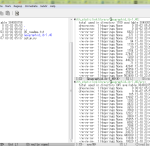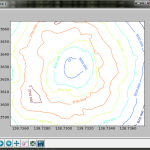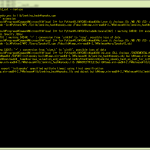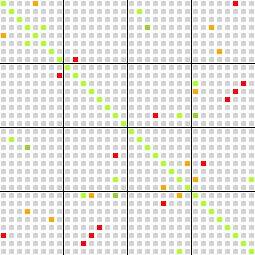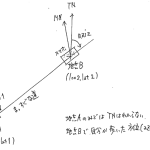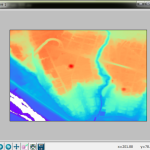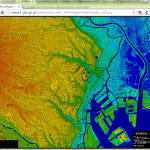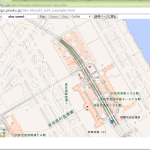C++ + GeographicLib で、1000程度の地点どうしの測距の性能と OpenMP 検証。
GeographicLibは、かなり厳密な計算をしている割には高速で、とはいえ複雑なぶん重いといえば重く、この種の総当たり測距では、リアルタイム性を求められるような場合だとやはり心配、なので、OpenMP で並列化したらどうだろうか、と。
ランダムな位置では風情がないので、データは OpenFlightsのairports.datを使う。こんなデータ:
1 1,"Goroka","Goroka","Papua New Guinea","GKA","AYGA",-6.081689,145.391881,5282,10,"U"
2 2,"Madang","Madang","Papua New Guinea","MAG","AYMD",-5.207083,145.7887,20,10,"U"
3 3,"Mount Hagen","Mount Hagen","Papua New Guinea","HGU","AYMH",-5.826789,144.295861,5388,10,"U"
4 4,"Nadzab","Nadzab","Papua New Guinea","LAE","AYNZ",-6.569828,146.726242,239,10,"U"
5 5,"Port Moresby Jacksons Intl","Port Moresby","Papua New Guinea","POM","AYPY",-9.443383,147.22005,146,10,"U"
6 6,"Wewak Intl","Wewak","Papua New Guinea","WWK","AYWK",-3.583828,143.669186,19,10,"U"
(入手当時(上で引用したもの)と今現在でフィールドが増えているようで、使ったデータには「Tz database time zone」は含まれていない。)
読み込んだデータ管理の構造:
1 struct airport_data {
2 std::map<std::string, std::string> feature;
3 double lat;
4 double lon;
5 int alt;
6 int timezone;
7 };
8 namespace std {
9 std::ostream& operator<<(std::ostream& os, const airport_data& d) {
10 airport_data& ad = const_cast<airport_data&>(d);
11 os << ad.feature["Name"] << " [" << ad.feature["ICAO"] << " (" << ad.feature["IATA/FAA"] << ")]";
12 return os;
13 }
14 };
データ読み込み部分は、凝ったインフラなしで愚直に(というよりはインチキに):
1 // --------------------------------------------------------------
2 // read all airports
3 std::vector<airport_data> all_airports;
4 char buf[256];
5 while (fgets(buf, 256, ::stdin)) {
6 // 1,"Goroka","Goroka","Papua New Guinea","GKA","AYGA",-6.081689,145.391881,5282,10,"U"
7 // Airport ID, Name, City, Country, IATA/FAA, ICAO, Lat, Lon, Alt, Timezone, DST
8 std::string tmp(&buf[0], &buf[std::strlen(buf) - 5]); // ignore DST
9 std::string(&tmp[tmp.find_first_of(',') + 1]).swap(tmp); // ignore Airport ID
10
11 std::string keys[] = {"Name", "City", "Country", "IATA/FAA", "ICAO"};
12 airport_data record;
13
14 int idx = 0;
15 for (int i = 0; i < 5; ++i) {
16 idx = tmp.find_first_of(',');
17 record.feature[keys[i]] = std::string(&tmp[0], &tmp[idx]);
18 if (record.feature[keys[i]] == "\\N") {
19 record.feature[keys[i]] = "";
20 } else {
21 std::string& s = record.feature[keys[i]];
22 std::string(&s[1], &s[s.size() - 1]).swap(s);
23 }
24 std::string(&tmp[tmp.find_first_of(',') + 1]).swap(tmp);
25 }
26 char* ep;
27 record.lat = std::strtod(&tmp[0], &ep);
28 record.lon = std::strtod(ep + 1, &ep);
29 record.alt = int(std::strtod(ep + 1, &ep));
30 record.timezone = int(std::strtod(ep + 1, &ep));
31 if (!record.feature["ICAO"].empty() &&
32 !record.feature["IATA/FAA"].empty() &&
33 (record.feature["Country"] == "Japan"
34 ||
35 record.feature["Country"] == "China"
36 ||
37 record.feature["Country"] == "United States"
38 //||
39 //record.feature["Country"] == "United Kingdom"
40 //||
41 //record.feature["Country"] == "Austria"
42 )) {
43 all_airports.push_back(record);
44 }
45 }
だいたい1000くらいになるように Country で絞り込んでいる。また、最初に触れた「今現在とデータフォーマットが違う」ことには全く柔軟に対応出来ないので、真似したい人は自力で頑張ってくださいまし。
あとは総当たり表を作って…。残り全部引用する:
1 /**
2 * COMPILE:
3 * with OpenMP: g++ expr_main.cpp -lGeographic -fopenmp -oexpr_main_OMP
4 * without OpenMP: g++ expr_main.cpp -lGeographic -oexpr_main
5 *
6 * EXEC:
7 * with OpenMP: LD_LIBRARY_PATH=/usr/local/lib:${LD_LIBRARY_PATH} ./expr_main_OMP < airports.dat
8 * without OpenMP: LD_LIBRARY_PATH=/usr/local/lib:${LD_LIBRARY_PATH} ./expr_main < airports.dat
9 */
10 #include <GeographicLib/Geodesic.hpp>
11 #include <cstdio>
12 #include <cstdlib>
13 #include <cstring>
14 #include <iostream>
15 #include <string>
16 #include <utility>
17 #include <map>
18 #include <vector>
19 #include <sstream>
20 #include <fstream>
21
22 #include <time.h>
23
24 double get_clock()
25 {
26 struct ::timespec ts;
27 ::clock_gettime(CLOCK_MONOTONIC, &ts);
28 return (ts.tv_sec + ts.tv_nsec * 1e-9) * 1000;
29 }
30
31 // ...(省略)...
32 //struct airport_data {
33
34 int main(void)
35 {
36 // --------------------------------------------------------------
37 // read all airports
38 // ...(省略)...
39
40 // --------------------------------------------------------------
41 // initialize results
42 double _ct = get_clock();
43 std::cout << "BEGIN initialize (" << all_airports.size() << " airports)" << std::endl;
44 std::vector< std::pair< std::pair<const airport_data*, const airport_data*>, double> >
45 result;
46 for (int i = 0; i < all_airports.size(); ++i) {
47 for (int j = i + 1; j < all_airports.size(); ++j) {
48 result.push_back(std::make_pair(std::make_pair(&all_airports[i],
49 &all_airports[j]),
50 double(0)));
51 }
52 }
53 std::cout
54 << "END initialize ("
55 << result.size()
56 << " pairs) - "
57 << get_clock() - _ct << " [ms]"
58 << std::endl;
59 // --------------------------------------------------------------
60 // calculate
61 std::cout << "BEGIN calculate" << std::endl;
62 _ct = get_clock();
63 GeographicLib::Geodesic
64 // equatorial radius (meters), flattening of ellipsoid
65 geod(6378137, 3.35281066475e-3);
66 {
67 {
68 #ifdef _OPENMP
69 #pragma omp parallel for
70 #endif // _OPENMP
71 for (int i = 0; i < result.size(); ++i) {
72 double s12;
73 double azi1;
74 double azi2;
75 geod.Inverse((result[i].first.first)->lat,
76 (result[i].first.first)->lon,
77 (result[i].first.second)->lat,
78 (result[i].first.second)->lon,
79 s12, azi1, azi2);
80 result[i].second = s12 / 1852.0;
81 }
82 }
83 }
84 std::cout
85 << "END calculate - "
86 << get_clock() - _ct << " [ms]"
87 << std::endl;
88 // --------------------------------------------------------------
89 // print
90 #ifdef _OPENMP
91 std::ofstream ofs("result_OMP.tsv");
92 #else // _OPENMP
93 std::ofstream ofs("result.tsv");
94 #endif // _OPENMP
95 for (int i = 0; i < result.size(); ++i) {
96 ofs << *result[i].first.first << "\t"
97 << *result[i].first.second << "\t"
98 << result[i].second << " [NM]" << std::endl;
99 ofs << *result[i].first.second << "\t"
100 << *result[i].first.first << "\t"
101 << result[i].second << " [NM]" << std::endl;
102 }
103 return 0;
104 }
結果:
1 me@host: ~$ g++ expr_main.cpp -lGeographic -fopenmp -oexpr_main_OMP
2 me@host: ~$ g++ expr_main.cpp -lGeographic -oexpr_main
3 me@host: ~$ LD_LIBRARY_PATH=/usr/local/lib:${LD_LIBRARY_PATH} ./expr_main < airports.dat
4 BEGIN initialize (1411 airports)
5 END initialize (994755 pairs) - 71.625 [ms]
6 BEGIN calculate
7 END calculate - 2112.39 [ms]
8
9 me@host: ~$ LD_LIBRARY_PATH=/usr/local/lib:${LD_LIBRARY_PATH} ./expr_main_OMP < airports.dat
10 BEGIN initialize (1411 airports)
11 END initialize (994755 pairs) - 72.0747 [ms]
12 BEGIN calculate
13 END calculate - 1159.11 [ms]
2コアCPUでの検証なので、OpenMP 版はだいたい2倍の速度が出ている。
OpenMP のサンプルとしては面白みがないただの parallel for である。GeographicLib のサンプルとしても、これもただ Inverse しているだけで、これもまた面白みには欠ける。ただ、「現実的な例」が欲しい人には、もしかしたら嬉しいかもしれないと思うので、公開してみた。ただし、「プロトタイプ」が目的でやってるので、かなり雑にやっている。そこは踏まえてください。



